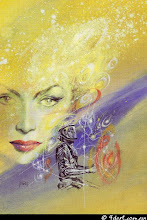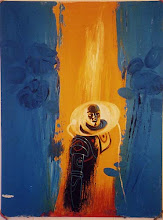James Fenimore Cooper-The Prairie






Ephemeral obsessions and other pretentious musings
 I can't recall having read a more thrilling adventure narrative than the first 200 pages of Fenimore's classic novel. The rest of the novel doesn't stand a chance. That's not to say a reader should put it down when Bumppo and Co. reach Fort William Henry. Last of the Mohicans is Cooper's second tale featuring his most endearing character Nathaniel Bumppo, or The Leatherstocking. This one is set about 40 years earlier than The Pioneers and the action occurs during the French and Indian War. I heartily recommend this book for lovers of great literature and adventure stories.
I can't recall having read a more thrilling adventure narrative than the first 200 pages of Fenimore's classic novel. The rest of the novel doesn't stand a chance. That's not to say a reader should put it down when Bumppo and Co. reach Fort William Henry. Last of the Mohicans is Cooper's second tale featuring his most endearing character Nathaniel Bumppo, or The Leatherstocking. This one is set about 40 years earlier than The Pioneers and the action occurs during the French and Indian War. I heartily recommend this book for lovers of great literature and adventure stories. This collection of weird tales creates strong moods and images in the mind of the reader. Ligotti is more interested in delving into the twisted psyches of his characters than creating a straightforward narrative. This he does extremely effectively. For fans of Lovecraft, Hodgson, Clark Ashton Smith, Robert Chambers, August Derleth, et al.
This collection of weird tales creates strong moods and images in the mind of the reader. Ligotti is more interested in delving into the twisted psyches of his characters than creating a straightforward narrative. This he does extremely effectively. For fans of Lovecraft, Hodgson, Clark Ashton Smith, Robert Chambers, August Derleth, et al. Gresham's twisted tale of guilt, greed, and sexual obsession, (are there any more important motivations for a noir tale?), is set amongst the world of carnys, spiritualists, and other charlatans looking to make a buck off the gullible during the 1940s. Stan Carlyle is a young man with a loaded past looking to make a splash, first as a carny huckster, then as a mentalist, and finally as a spiritual leader. Like all novels of this ilk it's good, guilty fun. This was filmed with Tyrone Power.
Gresham's twisted tale of guilt, greed, and sexual obsession, (are there any more important motivations for a noir tale?), is set amongst the world of carnys, spiritualists, and other charlatans looking to make a buck off the gullible during the 1940s. Stan Carlyle is a young man with a loaded past looking to make a splash, first as a carny huckster, then as a mentalist, and finally as a spiritual leader. Like all novels of this ilk it's good, guilty fun. This was filmed with Tyrone Power. Another strong satire from the Strugatskys. (Sorry, I'm running out of steam here)
Another strong satire from the Strugatskys. (Sorry, I'm running out of steam here)

 Being a huge fan of Del Toro's cinema I knew it would simply be a matter of time before I got around to reading this. First and foremost you can absolutely feel the cinematic quality to this book, and while flawed, I did ultimately enjoy it on a pulpy level.
Being a huge fan of Del Toro's cinema I knew it would simply be a matter of time before I got around to reading this. First and foremost you can absolutely feel the cinematic quality to this book, and while flawed, I did ultimately enjoy it on a pulpy level. I finally pulled this volume off my unread shelf, delved into the first novel and was rewarded with a richly textured, beautifully painted portrait of life in the wilds of upstate New York near the end of the 18th Century.
I finally pulled this volume off my unread shelf, delved into the first novel and was rewarded with a richly textured, beautifully painted portrait of life in the wilds of upstate New York near the end of the 18th Century.  Graham Joyce is one of my favorite contemporary novelists, but the multiple-award winner seems little known here in the U.S. This is the 7th novel of his that I have read and they are all well worth the time and effort.
Graham Joyce is one of my favorite contemporary novelists, but the multiple-award winner seems little known here in the U.S. This is the 7th novel of his that I have read and they are all well worth the time and effort. Written in 1944, The Big Clock is a swiftly-paced noir set in the publishing world. While it lacks the swagger of Hammett or Chandler, the grit of David Goodis, or the psychological depth of JIm Thompson, The Big Clock strings you along its not too many pages and drops you off unruffled, but entertained.
Written in 1944, The Big Clock is a swiftly-paced noir set in the publishing world. While it lacks the swagger of Hammett or Chandler, the grit of David Goodis, or the psychological depth of JIm Thompson, The Big Clock strings you along its not too many pages and drops you off unruffled, but entertained. I have read quite a bit of Soviet science fiction, and after the Strugatskys, Kirill Bulychev is probably the best of the bunch. This collection of short stories, half of which are loosely connected through their locale and central character, is full of insight, comic touches, clever circumstances, and assured writing. If you have exhausted the works of Boris and Arkady Strugatsky, which I nearly have, give Bulychev a try.
I have read quite a bit of Soviet science fiction, and after the Strugatskys, Kirill Bulychev is probably the best of the bunch. This collection of short stories, half of which are loosely connected through their locale and central character, is full of insight, comic touches, clever circumstances, and assured writing. If you have exhausted the works of Boris and Arkady Strugatsky, which I nearly have, give Bulychev a try. Another heavyweight of the Italian soundtrack, Armando Trovaioli has composed for over 200 films. His soundtrack for Una Magnum Special Per Tony Saitta is absolutely one of the best Poliziotteschi scores ever, which pretty much makes it one of the greatest overall. Check out the track Blazing Magnum:
Another heavyweight of the Italian soundtrack, Armando Trovaioli has composed for over 200 films. His soundtrack for Una Magnum Special Per Tony Saitta is absolutely one of the best Poliziotteschi scores ever, which pretty much makes it one of the greatest overall. Check out the track Blazing Magnum: Kirkman keeps the tension high as the survivors begin to assimilate and splinter within their new community. These can't come fast enough.
Kirkman keeps the tension high as the survivors begin to assimilate and splinter within their new community. These can't come fast enough. Quirky, but unsatisfying comic about H.P.Lovecraft and the fictional origins of some of his stories. I'm a huge Lovecraft fan, and that might be a detractor here as it is hard to swallow Lovecraft as the individual portrayed within. I'll give Vol. 2 a shot and reappraise.
Quirky, but unsatisfying comic about H.P.Lovecraft and the fictional origins of some of his stories. I'm a huge Lovecraft fan, and that might be a detractor here as it is hard to swallow Lovecraft as the individual portrayed within. I'll give Vol. 2 a shot and reappraise. Neil Gaiman is a supremely talented storyteller. Combine that with his obvious erudition and you get some damn fine books. The Graveyard Book, geared for younger readers, is a clever and fun read throughout.
Neil Gaiman is a supremely talented storyteller. Combine that with his obvious erudition and you get some damn fine books. The Graveyard Book, geared for younger readers, is a clever and fun read throughout. Early noir novel is good, simple storytelling that, in many ways, is similar to Bonnie and Clyde. I really enjoyed the characters speech, cadence, and dialect. This was filmed as They Live By Night is 1948, and again by Robert Altman in 1974.
Early noir novel is good, simple storytelling that, in many ways, is similar to Bonnie and Clyde. I really enjoyed the characters speech, cadence, and dialect. This was filmed as They Live By Night is 1948, and again by Robert Altman in 1974. This Strugatsky novel is set on a planet that has not yet advanced beyond a phase similar to our Middle Ages. Envoys from Earth have become assimilated to observe, but not interact. Though they are sickened by the barbaric society they observe, they are forbidden from intervening, hence the title. The novel's central ideas explore how the progress of science and civilization is often stymied by religious and magisterial oppression.
This Strugatsky novel is set on a planet that has not yet advanced beyond a phase similar to our Middle Ages. Envoys from Earth have become assimilated to observe, but not interact. Though they are sickened by the barbaric society they observe, they are forbidden from intervening, hence the title. The novel's central ideas explore how the progress of science and civilization is often stymied by religious and magisterial oppression. I've read a lot of Dan Simmons and this was really one of my favorite novels by him. A seriously epic space opera that is concluded in an even longer sequel entitled Olympos. I'm not even going to attempt a plot synopsis here, but suffice it to say that if big scope, epic sci-fi is your thing, you'll probably like this.
I've read a lot of Dan Simmons and this was really one of my favorite novels by him. A seriously epic space opera that is concluded in an even longer sequel entitled Olympos. I'm not even going to attempt a plot synopsis here, but suffice it to say that if big scope, epic sci-fi is your thing, you'll probably like this.









































